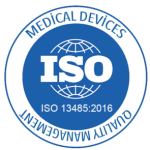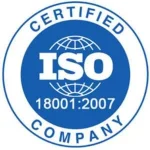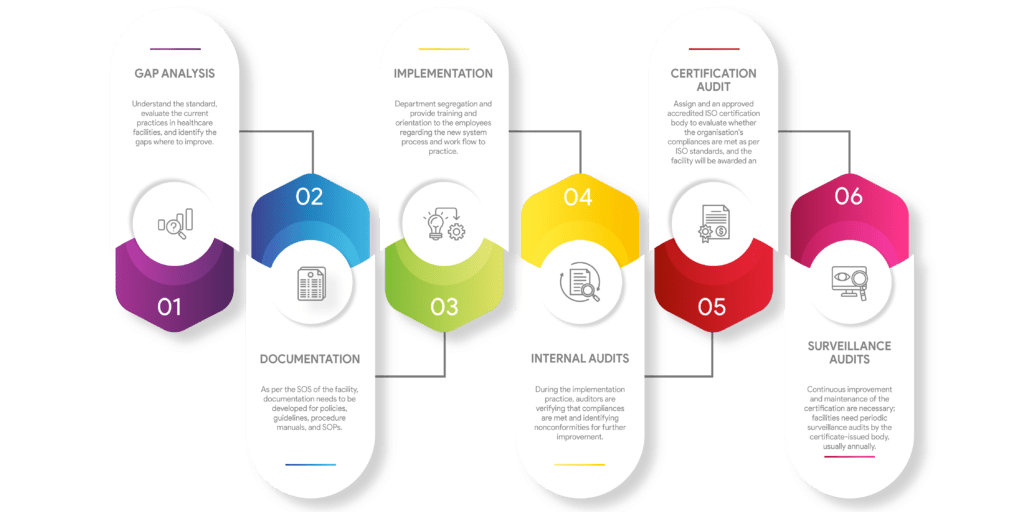Medical Facility ISO Accreditation
Medical Facility ISO Accreditation Services in UAE
Trusted ISO Compliance for Healthcare Facilities by Chartered Business Assurance
Chartered Business Assurance (CBA), based in the UAE, specializes in providing ISO accreditation support to healthcare facilities such as hospitals, clinics, medical centers, laboratories, and daycare surgery centers. Our expert consultants ensure full compliance with international ISO standards, enhancing quality, safety, and operational efficiency across your organization.
Why ISO Accreditation Matters for Healthcare Facilities
ISO accreditation is an internationally recognized benchmark of quality, safety, and efficiency. It assures patients, stakeholders, and regulators that your facility adheres to globally accepted standards through documented procedures, continuous monitoring, and improvement.
CBA helps implement these standards through technical audits, staff training, SOP development, and compliance checklists — tailored to your facility's needs.
ISO Standards We Support for Medical Facilities
ISO 9001: Quality Management Systems (QMS)

ISO 9001 is the standard criteria for healthcare facilities for quality management systems applicable in healthcare facility operations. Healthcare facilities can improve patients’ satisfaction, reduce waiting times, reduce medical errors, and improve the overall quality of service delivery. Further, 9001 ensures documentation for patient files, employee files, medical records, and continuous improvement. By achieving ISO 9001, the facility, earn the trust of patients and stakeholders.
We provide you with the necessary controls and guidelines as per the specified standards and work with you to accomplish the requirements as per the ISO standard.
ISO 27001: Information Security Management Systems (ISMS)

Protect confidential patient and business information.
ISO 27001 ensures your facility's information is protected from threats — whether stored on-site, online, or outsourced. It covers cyber risks, data privacy, staff access protocols, and cloud storage compliance.
Benefits:
Prevent data breaches
Secure patient and company records
Align with UAE digital privacy laws
Boost trust from clients and partners
ISO 45001: Occupational Health and Safety Management

Ensure a safe workplace for healthcare staff and patients.
ISO 45001 focuses on risk prevention, workplace safety, and staff wellbeing. It supports both clinical and non-clinical teams by identifying hazards and improving emergency preparedness.
Benefits:
- Protects staff and patients
- Fulfills UAE labor and health regulations
- Improves your facility’s reputation
- Reduces accident-related downtime
ISO 31000: Risk Management Framework

Identify, assess, and mitigate healthcare risks.
This standard helps you establish a structured approach to managing risks — clinical, operational, financial, or environmental — that could impact your facility.
Benefits:
Systematic risk control
Better decision-making
Proactive risk mitigation
Enhanced stakeholder confidence
ISO 13485: Medical Devices Quality Management

Comply with international standards for medical devices.
ISO 13485 applies to facilities that manufacture, use, or maintain medical devices. It ensures device safety, proper calibration, traceability, and documentation.
Benefits:
- Safe and reliable devices
- Regulatory compliance
- Supports patient care excellence
- Lower liability risks
ISO 18001 / OHSAS: Occupational Health & Safety (Legacy Standard)

Although now replaced by ISO 45001, some facilities still seek assistance in transitioning from ISO 18001. CBA supports both frameworks and ensures a smooth migration path.
Green & Clean Hospital Accreditation 🌿
Build an environmentally sustainable healthcare facility.
Modern hospitals face challenges with bio-waste, high energy consumption, and toxic materials. Our green accreditation framework helps your facility adopt energy-efficient practices and eco-friendly operations.
Benefits:
Reduced operational costs
Lower carbon footprint
Safe waste disposal
Enhanced public image
Process Flow Chart
The certification process involves multiple steps starting from gap analysis to the issuance of the ISO certificate and surveillance audits. The following steps demonstrate how ISO certification can be obtained for healthcare facilities

Note: SOS – Scope of Services, SOPs – Standard Operating Procedures
Another benefit of obtaining ISO is it prevents medical errors once effectively following the standard. Medical errors can pose serious threats to patient safety. Both healthcare professionals and patients suffer from near medical errors, often leading to adverse events. Poor healthcare quality may directly or indirectly threaten patient health and quality of life. ISO focuses on enhancing patient safety and the quality of health service delivery, supporting healthcare investors, professionals, and patients alike.
CBA facilitates this process by conducting mock audits to assess the facility’s preparedness and help address any existing gaps.
